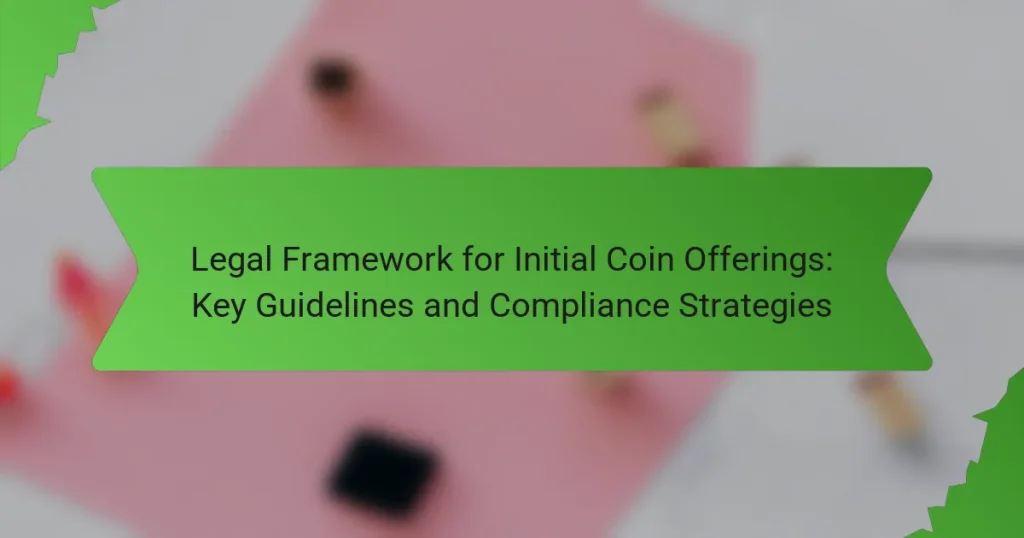The legal framework for Initial Coin Offerings (ICOs) encompasses regulations related to securities, anti-money laundering (AML), and consumer protection, which vary across jurisdictions. In the United States, the Securities and Exchange Commission (SEC) assesses whether an ICO qualifies as a security, subjecting it to the Securities Act of 1933. The European Union is developing the Markets in Crypto-Assets (MiCA) regulation to enhance clarity and investor protection for ICOs. Key compliance guidelines include understanding local securities laws, ensuring transparency through proper disclosures, and implementing robust KYC and AML measures. Companies must navigate these regulations to mitigate legal risks and ensure the successful operation of their ICOs.

What is the Legal Framework for Initial Coin Offerings?
The legal framework for Initial Coin Offerings (ICOs) varies by jurisdiction. It primarily involves securities regulations, anti-money laundering (AML) laws, and consumer protection laws. In the United States, the Securities and Exchange Commission (SEC) determines if an ICO is a security. If deemed a security, it must comply with registration requirements under the Securities Act of 1933.
In the European Union, the Markets in Crypto-Assets (MiCA) regulation is being developed to provide clarity on ICOs. This framework aims to protect investors and ensure market integrity. Additionally, many countries require ICOs to adhere to AML and Know Your Customer (KYC) regulations.
These regulations help prevent fraud and protect investors. Compliance with these legal frameworks is crucial for the success and legality of an ICO.
How do Initial Coin Offerings function within the legal landscape?
Initial Coin Offerings (ICOs) operate within a complex legal landscape that varies by jurisdiction. ICOs are fundraising mechanisms where new cryptocurrencies are sold to investors. Regulatory bodies assess whether ICOs qualify as securities. In the United States, the Securities and Exchange Commission (SEC) applies the Howey Test to determine this classification. If deemed securities, ICOs must comply with registration requirements. This includes providing disclosures to protect investors. Non-compliance can lead to legal penalties and investor lawsuits. Other countries have different regulations, impacting how ICOs are structured. For example, some nations have embraced ICOs with lighter regulations, while others have imposed outright bans. Understanding these legal frameworks is crucial for ICO organizers to ensure compliance and avoid legal issues.
What are the key components of an Initial Coin Offering?
The key components of an Initial Coin Offering (ICO) include the whitepaper, token distribution, fundraising goals, and compliance with regulations. The whitepaper outlines the project’s purpose, technology, and roadmap. Token distribution details how tokens will be allocated to investors and team members. Fundraising goals specify the amount of capital needed and the duration of the offering. Compliance with regulations ensures adherence to legal requirements, which may vary by jurisdiction. These components are essential for a successful ICO and help build investor trust.
How does regulation impact the structure of Initial Coin Offerings?
Regulation significantly impacts the structure of Initial Coin Offerings (ICOs) by establishing legal requirements that shape their design and execution. Regulatory bodies, such as the SEC in the United States, classify many ICOs as securities. This classification imposes obligations for registration and compliance with securities laws.
As a result, ICOs must provide detailed disclosures to potential investors. These disclosures include information about the project, financial projections, and risks involved. Additionally, regulations often require ICOs to implement Know Your Customer (KYC) and Anti-Money Laundering (AML) procedures.
Such requirements can influence the overall fundraising strategy and timeline of an ICO. Compliance with regulations can also affect the market perception and trust in the ICO. Projects that adhere to regulations may attract more institutional investors. Conversely, non-compliant ICOs risk facing legal actions, which can deter participants.
In 2017, the SEC’s guidance on ICOs led to a decline in unregulated offerings, demonstrating the regulatory impact. Overall, regulation shapes the ICO landscape by enforcing standards aimed at protecting investors and promoting transparency.
Why is a legal framework essential for Initial Coin Offerings?
A legal framework is essential for Initial Coin Offerings (ICOs) to ensure regulatory compliance and investor protection. Without clear regulations, ICOs can lead to fraudulent activities and financial losses. A legal framework provides guidelines on the classification of tokens, determining whether they are securities or utility tokens. This classification affects how ICOs are regulated in different jurisdictions. Regulatory clarity helps build trust among investors, encouraging participation in ICOs. Countries like the United States have implemented frameworks, such as the Howey Test, to assess token offerings. This legal clarity aims to reduce risks associated with scams and market manipulation. Therefore, a robust legal framework is crucial for fostering a safe and transparent ICO environment.
What risks are associated with unregulated Initial Coin Offerings?
Unregulated Initial Coin Offerings (ICOs) pose significant risks to investors. These risks include fraud, as there may be no oversight to verify the legitimacy of the project. Investors can lose their entire investment due to lack of transparency. Regulatory bodies often do not provide protection in these scenarios. Additionally, unregulated ICOs can lead to market manipulation, impacting token value unpredictably. Security vulnerabilities in the technology may expose investors to hacking incidents. Legal repercussions can arise if the ICO is later deemed illegal, leading to potential loss of funds. The absence of consumer recourse mechanisms further heightens investor vulnerability. Overall, the lack of regulation creates an environment ripe for exploitation and financial loss.
How does a legal framework protect investors in Initial Coin Offerings?
A legal framework protects investors in Initial Coin Offerings (ICOs) by establishing regulations that ensure transparency and accountability. These regulations require ICO issuers to disclose relevant information about their projects. Investors gain access to critical data, such as financial projections and risks, which aids informed decision-making. Legal frameworks also enforce anti-fraud measures to deter misleading practices. For instance, jurisdictions like the United States require compliance with securities laws, ensuring that ICOs are registered and regulated. This helps to mitigate the risk of scams and enhances investor confidence. Furthermore, legal recourse is available for investors in cases of fraud or misrepresentation, providing a safety net. Overall, a robust legal framework fosters a safer investment environment in the ICO landscape.

What are the key guidelines for compliance in Initial Coin Offerings?
Key guidelines for compliance in Initial Coin Offerings (ICOs) include adhering to securities regulations, ensuring proper disclosures, and implementing Anti-Money Laundering (AML) measures. ICOs must determine if tokens qualify as securities under local laws. If so, they require proper registration or exemptions. Clear and comprehensive disclosures about the project, risks, and use of funds are essential for investor transparency. Additionally, implementing AML measures helps prevent illicit activities. Following these guidelines ensures legal compliance and protects investors.
What regulatory bodies oversee Initial Coin Offerings?
The regulatory bodies that oversee Initial Coin Offerings (ICOs) vary by jurisdiction. In the United States, the Securities and Exchange Commission (SEC) is the primary regulator. The SEC evaluates whether ICOs involve securities under U.S. law. In the European Union, the European Securities and Markets Authority (ESMA) provides guidance and oversight. Various national regulators, like the Financial Conduct Authority (FCA) in the UK, also play significant roles. In Asia, countries like Singapore have the Monetary Authority of Singapore (MAS) overseeing ICO regulations. Each of these bodies establishes rules to protect investors and ensure compliance with financial laws.
What roles do the SEC and CFTC play in regulating Initial Coin Offerings?
The SEC and CFTC play crucial roles in regulating Initial Coin Offerings (ICOs). The SEC primarily oversees ICOs that qualify as securities under U.S. law. This includes enforcing compliance with securities registration requirements. The agency aims to protect investors and ensure transparent market practices.
The CFTC, on the other hand, regulates ICOs that involve derivatives or commodities. This includes overseeing trading platforms and ensuring fair practices in the derivatives market. Both agencies work to prevent fraud and manipulation in the cryptocurrency space.
Their regulatory frameworks aim to create a safer environment for investors while fostering innovation in the blockchain industry. In 2018, the SEC stated that many ICO tokens are securities, reinforcing its jurisdiction. The CFTC has also taken action against fraudulent ICOs, highlighting its enforcement role.
How do international regulations differ for Initial Coin Offerings?
International regulations for Initial Coin Offerings (ICOs) vary significantly across countries. In the United States, ICOs are subject to securities laws, requiring registration with the SEC if tokens are deemed securities. Conversely, Switzerland adopts a more flexible approach, categorizing tokens based on their function and applying relevant financial regulations accordingly. In contrast, countries like China have outright banned ICOs due to concerns over fraud and financial stability. The European Union is in the process of establishing a comprehensive regulatory framework, aiming for consistency among member states. These differences reflect varying attitudes towards cryptocurrency and investor protection. Each jurisdiction’s stance influences the operational landscape for ICOs globally.
What are the main compliance requirements for conducting an Initial Coin Offering?
The main compliance requirements for conducting an Initial Coin Offering (ICO) include adherence to securities regulations, anti-money laundering (AML) laws, and know your customer (KYC) protocols. ICOs must determine if their tokens qualify as securities under local laws. If classified as securities, issuers must register with regulatory authorities or seek exemptions. Compliance with AML laws requires implementing measures to prevent illicit activities. KYC protocols mandate the verification of investors’ identities to ensure compliance with regulations. These requirements vary by jurisdiction, so issuers must consult local regulations to ensure full compliance.
What documentation is necessary for compliance?
Necessary documentation for compliance includes a prospectus or whitepaper. This document outlines the details of the Initial Coin Offering (ICO). It describes the project’s goals, technology, and tokenomics. Additionally, Know Your Customer (KYC) documentation is required. This verifies the identity of participants. Anti-Money Laundering (AML) policies must also be documented. These policies ensure that funds are not sourced from illegal activities. Financial statements may be necessary to demonstrate fiscal health. Regulatory filings depend on the jurisdiction of the ICO. Each country may have specific requirements that must be met for legal compliance.
How can companies ensure transparency in their Initial Coin Offering process?
Companies can ensure transparency in their Initial Coin Offering (ICO) process by providing clear and comprehensive information to potential investors. This includes detailed whitepapers that outline the project’s goals, technology, and tokenomics. Regular updates on project development and financial status also contribute to transparency. Companies should comply with relevant regulations and disclose any risks associated with the investment. Engaging with the community through open channels for feedback and questions fosters trust. Moreover, independent audits of the ICO process can provide third-party validation, enhancing credibility. These practices align with best practices in the industry and help build investor confidence.

How can companies develop effective compliance strategies for Initial Coin Offerings?
Companies can develop effective compliance strategies for Initial Coin Offerings (ICOs) by establishing a comprehensive legal framework. This framework should include understanding the regulatory landscape specific to ICOs. Companies must identify the jurisdictions where they operate and the corresponding regulations. Engaging legal experts in cryptocurrency law is crucial for navigating these complexities.
Additionally, companies should implement robust Know Your Customer (KYC) and Anti-Money Laundering (AML) procedures. These procedures help verify the identity of investors and ensure compliance with financial regulations. Regular audits and compliance checks can further reinforce adherence to legal standards.
Staying updated with evolving regulations is vital, as ICO laws are subject to change. Companies should also develop transparent communication strategies to inform stakeholders about compliance efforts. By taking these steps, companies can create effective compliance strategies for ICOs that mitigate legal risks.
What best practices should companies follow for compliance?
Companies should implement clear compliance policies and procedures. These policies should align with relevant regulations and guidelines. Regular training sessions for employees are essential to ensure understanding of compliance requirements. Companies must conduct thorough risk assessments to identify potential compliance issues. Establishing a dedicated compliance officer or team can enhance oversight. Regular audits and reviews of compliance practices help maintain adherence to regulations. Documenting all compliance efforts provides a clear record for regulatory review. Engaging legal counsel familiar with the industry ensures that companies stay updated on changing regulations.
How can legal counsel assist in the compliance process?
Legal counsel can assist in the compliance process by providing expert legal advice on regulatory requirements. They help organizations understand relevant laws and regulations governing their operations. This includes guidance on securities laws, anti-money laundering, and consumer protection regulations. Legal counsel can also draft and review compliance policies and procedures. They ensure that these documents align with legal standards and best practices. Additionally, legal counsel can assist in training staff on compliance matters. They can represent the organization during regulatory audits or investigations. Their expertise reduces the risk of legal penalties and enhances overall compliance.
What tools and resources are available for compliance management?
Compliance management tools include software solutions, frameworks, and guidelines. Notable tools are compliance management software like LogicManager and ComplyAdvantage. These platforms help organizations manage regulations and mitigate risks. Resources also include industry guidelines such as ISO 19600 and COSO frameworks. These guidelines provide structured approaches to compliance and risk management. Additionally, professional organizations offer training and certifications in compliance management. Such resources enhance understanding and implementation of compliance strategies.
What common challenges do companies face in the compliance process?
Companies face several common challenges in the compliance process. One major challenge is staying updated with constantly changing regulations. Regulations can vary significantly across jurisdictions, complicating compliance efforts. Another challenge is the complexity of the compliance requirements themselves. Many companies struggle to interpret and implement these requirements effectively. Resource constraints, including limited personnel and budget, also hinder compliance efforts. Additionally, a lack of awareness or training among employees can lead to compliance failures. Companies may also face challenges in integrating compliance into their business operations seamlessly. Finally, the risk of non-compliance can result in severe penalties, adding pressure to ensure adherence.
How can companies navigate regulatory changes affecting Initial Coin Offerings?
Companies can navigate regulatory changes affecting Initial Coin Offerings (ICOs) by staying informed and adaptable. They should regularly monitor updates from regulatory bodies like the SEC. Establishing a compliance team can help ensure adherence to evolving laws. Engaging legal experts specialized in cryptocurrency regulations is crucial. Companies must also conduct thorough risk assessments to identify potential regulatory impacts. Developing transparent communication with stakeholders enhances trust and compliance. Implementing robust record-keeping practices supports regulatory reporting requirements. Lastly, participating in industry groups can provide insights and best practices for navigating changes effectively.
What are the potential consequences of non-compliance in Initial Coin Offerings?
Non-compliance in Initial Coin Offerings (ICOs) can lead to severe legal consequences. Regulatory authorities may impose fines on non-compliant entities. These fines can reach millions of dollars depending on the severity of the violation. Additionally, companies may face legal action from investors seeking restitution. This can result in costly lawsuits and damage to reputation. Furthermore, non-compliance can lead to the suspension or revocation of operating licenses. This effectively halts business operations and impacts future fundraising efforts. Regulatory bodies, like the SEC, actively pursue enforcement actions against non-compliant ICOs. Historical cases demonstrate that non-compliant ICOs often face scrutiny and penalties.
What practical tips can companies implement for successful compliance in Initial Coin Offerings?
Companies can implement several practical tips for successful compliance in Initial Coin Offerings (ICOs). First, they should conduct thorough legal research to understand the regulatory landscape. This includes identifying applicable laws in the jurisdictions where they operate. Next, companies should engage legal experts specializing in cryptocurrency regulations. These professionals can provide guidance on compliance requirements and best practices.
Additionally, companies should develop a comprehensive compliance framework. This framework should outline procedures for investor verification, anti-money laundering (AML), and know your customer (KYC) practices. Transparency is crucial; companies must provide clear and accurate information about the ICO to potential investors.
Regular audits and assessments of compliance practices can help identify and address potential issues early. Companies should also stay updated on regulatory changes, as the cryptocurrency landscape is continuously evolving. Finally, establishing a clear communication strategy with regulators can foster a cooperative relationship and enhance compliance efforts.
The main entity of this article is the legal framework governing Initial Coin Offerings (ICOs). The article provides a detailed overview of the regulatory landscape for ICOs, highlighting essential components such as securities regulations, anti-money laundering (AML) laws, and consumer protection measures. It discusses the role of regulatory bodies like the SEC and CFTC, compliance requirements for ICOs, and the importance of transparency and investor protection. Additionally, the article outlines best practices for companies to develop effective compliance strategies and navigate the complexities of evolving regulations, emphasizing the potential consequences of non-compliance.




